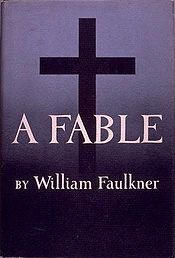(in ten beautiful bullet points)
1. William Faulkner won his second national book award for A Fable. He published it in 1954. I didn’t finish it. I will never finish it. I will never, if I can help it, read another sentence of it.
2. Life. Is. Too. Short.
3. Reading Faulkner’s novels is an unpleasant experience. I don’t like it. I have an appetite for experimental, dense fiction, but Faulkner’s appeal escapes me. His novels are obtuse, dense, strangely worded. Their meaning is elided through heady slips of time and pronoun switcheroos[1]. If writing is, in essence, a form of communication, then Faulkner is often a terrible writer.
4. A Fable is a lazy, miserable title for any novel, and doesn’t fit this book at all. Compare it to Faulkner’s other titles: As I Lay Dying; The Sound and the Fury; A Light in August; Go Down, Moses. Even if you like Faulkner, that’s all you need to know right there.
5. A Fable takes place during World War I. The story involves a battalion of French troops who mutiny and refuse to fight. The German soldiers soon follow suit. The war stops because the soldiers won’t fight anymore. The commanders on each side get together to kick-start the violence once again. It’s a parable with tons of symbolism thrown in. I learned this from the back cover. Reading 50 pages offered up little in the way of understanding. I think instead I’ll go and re-watch Paths of Glory again.
6. This same year, William Golding published Lord of the Flies; J.R.R. Tolkein released The Fellowship of the Ring; Kingsley Amis published Lucky Jim; and Iris Murdoch published Under the Net. The British had invaded once again. Left us yanks miles behind.
7. And what the hell was happening to American fiction anyway? 1954 was a dreadful year. (So was 1953.) Steinbeck published one of his weaker novels, and James Michener and Richard Matheson each put out books. The other novels of the year are all forgettable or forgotten.
8. Dr. Seuss published Horton Hears a Who. Seuss had arguably the best American book of the year. Strangely, it wasn’t nominated.
9. Ernest Hemingway, Faulkner’s friend and occasional rival, won the Nobel Prize for Literature. Seems relevant. Not sure what to make of it.
10. James Jones, Saul Bellow and William Faulkner in a row has me rethinking my reading plan. Will soldier on.
[1] I love when Josef Conrad does it; The Secret Agent is one of my favorite novels.
